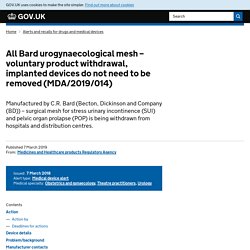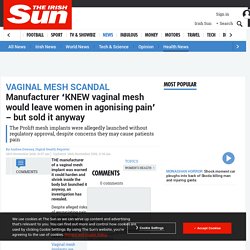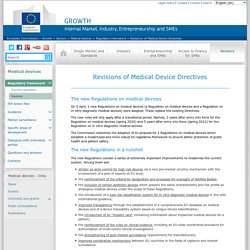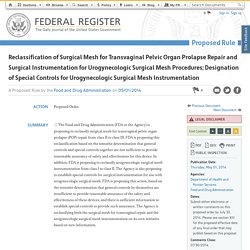

All Bard urogynaecological mesh – voluntary product withdrawal, implanted devices do not need to be removed (MDA/2019/014) Action If you work in procurement or are a healthcare professional: Identify and quarantine affected, unused devices listed in the manufacturer notice from BARD Ensure, in cooperation with implanting surgeons, that suitable alternative devices are available Follow the actions listed in the manufacturer notice from BARD Report adverse events involving these devices through your local incident reporting system and/or your national incident reporting authority as appropriate: England, Scotland, Northern Ireland, Wales.

Manufacturer 'KNEW vaginal mesh would leave women in agonising pain' - but sold it anyway. THE manufacturer of a vaginal mesh implant was warned it could harden and shrink inside the body but launched it anyway, an investigation has revealed.

Despite alleged risks of excruciating pain to patients the Prolift implant was launched in 2005 and marketed for seven years. Handout Staff at Johnson & Johnson (J&J) were concerned the mesh implant would turn "hard as a rock" and shrivel like a "folded potato chip" inside patients, internal emails seen by The Guardian have revealed.
The documents are among hundreds submitted to a US court as part of a civil case brought by Suzanne Emmett from Pennsylvania - one of many who claim they suffered traumatic complications from the implant. The Prolift was designed to treat pelvic floor prolapse, when the organs in the pelvis weaken and drop into the vagina. Obstetrics, gynecology and reproductive medicine - Guidelines, reviews, position statements, recommendations, standards. Français - Español - Italiano - Deutsch Obstetrics, gynecology and reproductive medicine Guidelines, reviews, position statements, recommendations, standards Adolescence - Andrology - Anemia and hemoglobinopathies - Breast diseases - Breastfeeding - Ethics, jurisprudence - Family planning - Female genital mutilation Female genital neoplasms - Genital infections, STD - Gynecology - Hepatitis - Hirsutism, acne, alopecia - HIV/AIDS - Infertility, miscarriage - Labor, delivery, postpartum Maternal and neonatal infections - Menopause - Menstruation disturbances, female gonadal disorders - Neonatology - Obesity, eating disorders Obstetrics, gynecology, sexual and reproductive health - Osteoporosis - Pregnancy - Prenatal screening and diagnosis - Sex differentiation disorders Sexual dysfunction - Trophoblastic neoplasms - Tuberculosis - Urinary tract infections - Urogynecology, incontinence - Violence.

The Independent Medicines & Medical Devices safety Review. Revisions of Medical Device Directives. The new Regulations on medical devices On 5 April, 2 new Regulations on medical devices (a Regulation on medical devices and a Regulation on in-vitro diagnostic medical devices) were adopted.

These replace the existing Directives. The new rules will only apply after a transitional period. V1N22006. Surgical_co_eau3. Hoe veilig is het gebruik van mesh-implantaten in de uro-gynaecologische chirurgie? Surgical_co_bendavid. News. Public Health (17-12-2015) Safety of surgical meshes used in urogynaecological surgery: final Opinion Today, the Scientific Committee on Emerging and Newly Identified Health Risks (SCENIHR) publish the final Opinion on the safety of surgical meshes used in urogynaecological surgery.

The Opinion looks at the risks associated with the use of surgical meshes for various conditions, how to identify high risk patient groups and further assessment needs. A key conclusion is that in assessing the risk associated with mesh application, it is important to consider the overall surface area of material used, the product design and the properties of the material used. Citizens_surgicalmeshes_en. PE01517: Polypropylene Mesh Medical Devices - Getting Involved. The petitioner has also collected 314 hard copy signatures.

Summary: 3 June 2014: The Committee took evidence from Elaine Holmes, Olive McIlroy, and Marion Scott, Sunday Mail. The Committee agreed to write to the Scottish Government, the Medicines Healthcare Products Regulatory Agency, NHS National Services Scotland, the European Commission, the Royal College of Surgeons of Edinburgh, the British Medical Association Scotland and NHS boards. The Committee also agreed to invite the Cabinet Secretary for Health and Wellbeing to give evidence at a future meeting. Medical devices. The role of medical devices is essential to the healthcare of EU citizens.

The diversity and innovativeness of this sector contributes significantly to the enhancement of both the quality and efficacy of healthcare in the EU. Covering a wide range of products, from simple bandages to the most sophisticated life-support equipment, the medical devices sector plays a crucial role in the diagnosis, prevention, monitoring and treatment of diseases. It also helps improve the quality of life of those with disabilities. Importance of Medical Devices Sector The medical devices sector helps save lives by providing innovative health care solutions regarding diagnosis, prevention and treatment. Mesh-wg-interim-rep. Public consultation on the preliminary opinion on surgical meshes. This opinion focuses on the health risks of meshes used in urogynaecological surgery, how to identify high risk patient groups and what are the assessment needs.

The SCENIHR considers three factors as being important when assessing the risks associated with mesh application: the overall surface area of material used, the product design and the properties of the material used. The available evidence suggests a higher morbidity in treating female pelvic organ prolapse, which uses a much larger amount of mesh compared to stress urinary incontinence. 00486661. Scenihr_o_049. Europe_proposed_medical_device_regulation_white_paper_1_.pdf.
Surgical_Mesh_Implants_April_2015.pdf. Reclassification of Surgical Mesh for Transvaginal Pelvic Organ Prolapse Repair and Surgical Instrumentation for Urogynecologic Surgical Mesh Procedures; Designation of Special Controls for Urogynecologic Surgical Mesh Instrumentation. Submit either electronic or written comments on this proposed order by July 30, 2014.

Please see section XIII for the proposed effective date of any final order that may publish based on this proposal. You may submit comments, identified by Docket No. FDA-2014-N-0297, by any of the following methods: Scenihr_q_036.pdf. Calls for parliamentary inquiry into use of surgical mesh. Last updated 18:21, May 27 2015 Complications arising from the use of surgical mesh are thought to occur in 20 per cent of cases.

Two women suffering the consequences of having surgical mesh implanted in their bodies have pleaded for MPs to hold an inquiry into its use. Campaigners call for surgical mesh inquiry. Campaigners against the use of surgical mesh have told a select committee there is new evidence that the polypropylene mesh degrades in the body, causing severe pain and complications. Carmel Berry and Charlotte Korte are calling for a commission of inquiry and a national register so that mesh implants and removals can be tracked. Surgical mesh is used in the treatment of hernias, pelvic prolapses and incontinence, among other procedures. Ms Kortee and Ms Berry are campaigning for a commission of inquiry into its use, telling a select committee there's new evidence from a Canadian researcher that shows it's harmful.
"It does degrade in the human body and it does have a chemical reaction in the human body, and this is contrary to the manufacturers' instructions," says Ms Berry. Since April 2005, more than 550 ACC claims involving the mesh have been decided, with 80 percent accepted.